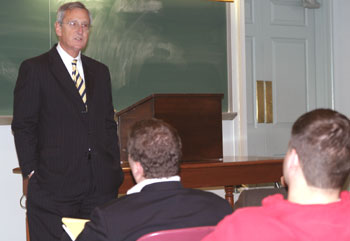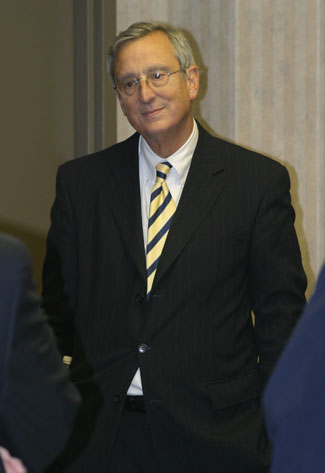 Indiana Supreme Court Justice Ted Boehm was an eyewitness to some of the most important United States Supreme Court decisions in history. He shared stories of law, personal insight and reflection for more than 50 Wabash students, faculty and staff Wednesday in a late afternoon presentation.
Indiana Supreme Court Justice Ted Boehm was an eyewitness to some of the most important United States Supreme Court decisions in history. He shared stories of law, personal insight and reflection for more than 50 Wabash students, faculty and staff Wednesday in a late afternoon presentation.
Boehm served as a law clerk for Supreme Court Chief Justice Earl Warren for the 1963-’64 term. The Warren Court handed down many landmark decisions in the 1960s and set law during Boehm’s one year on redistricting, First Amendment issues, and cases involving civil rights.
"The atmosphere was dramatically different then," Boehn said. "If you wanted to walk into the United States Supreme Court and watch them argue a case you pretty much could do it any day you wished. Security was also pretty much non-existent."
He described a time of less political discourse and less government in Washington.
While the Warren Court has often been criticized for an agenda of social change, Boehn suggested the court did what it had to do.
"At the time I think I was somewhat more sympathetic to that criticism than I am today," Boehm said. "In my view there are some things where the court has to act because nobody else can. We have to have a way to resolve these situations short of tanks in the street.
"There are people who are still fighting that battle but the notion we need to have one person and one vote and we need to have an integrated society are pretty much accepted by everybody today even though they were battles in those days."
It was the unique historical perspective that pleased Visiting Assistant Professor of Political Science Scott Himsel.
 "This was a great speech and it exceeded my expectations because what he was able to do was take us back to an extremely important, controversial time and tell us what it was really like to be there," Himsel said.
"This was a great speech and it exceeded my expectations because what he was able to do was take us back to an extremely important, controversial time and tell us what it was really like to be there," Himsel said.
The Justice’s remarks discussed landmark cases often discussed in Wabash College classrooms.
"Justice Boehm touched upon New York Times vs. Sullivan, which sets the modern standard, for pursuing a libel action against a public official," Himsel said. "We just taught that case this semester. My students can now realize how important that case was and to hear again just how different things were in the courts then."
But Boehm’s anecdotes also gave his remarks a personal insight a textbook can not.
"We have a picture upstairs in Rm. 212 of Earl Warren," Himsel said. "He looks a little forbidding. But to hear what he was like on a personal basis one-on-one with his law clerks, that he took them to baseball games, that he reported to them every week about how the conference with the court went … that treated them well and treated them as part of the team, it’s just wonderful. It’s really rare for a college student to have that kind of interaction and hear that directly from an eyewitness."
Boehm tackled a wide range of subjects in more than a half hour of questions and answers.
He didn’t believe the Warren Court would have heard the 2000 Bush vs. Gore case which decided the presidential election. "I do not see that as Constitutional with any set of principles I understand other than I have the power to do it so I’ll do it. It seems to me that was a matter of state law."
He also weighed in on the recent Congressional action involving the Florida right-to-die case of Terri Schiavo. He was surprised Congress intervened by passing legislation allowing the case to proceed to federal court after being rejected by Florida state courts. He warned that it opens the door for Congress to act any time it disagrees with a court’s decision.
Boehm’s appearance was sponsored by Wabash College’s Pre-Law Committee.
Hewitt is Wabash College's Director of New Media and Web Content Editor.
In photos:
To left: Boehm speaks to more than 50 students, faculty, staff and community members.
Lower right: Boehm listens to a student question during a reception.